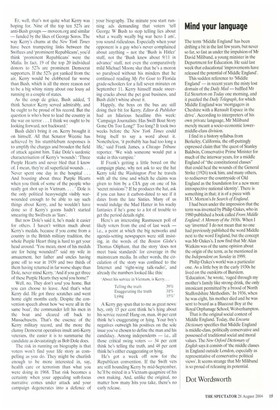Mind your language
The term 'Middle Englandhas been drifting a bit in the last few years, but never so far, so fast as under the impulsion of Mr David Miliband, a young minister in the Department for Education. He said last week that educational 'improvements have released the potential of Middle England',
This sudden reference to 'Middle England' — in recent years the misty lost domain of the Daily Mail — baffled Mr Ed Stourton on Today one morning, and it puzzled the Daily Telegraph, for which Middle England was `mortgagers in Cheshire with a Renault Espace in the drive'. According to interpreters of his own private language, Mr Miliband merely meant a socio-economic lowermiddle-class division.
I find in a history syllabus from Berkeley, California, the off-puttingly expressed claim that 'the quest of Stanley Baldwin, Conservative Prime Minister for much of the interwar years, for a middle England of "the constitutional classes" that could heal the wounds of the General Strike (1926) took him, and many others, to rediscover the countryside of Old England as the foundation for a new more introspective national identity'. There is something in that; it is of a piece with H.V. Morton's In Search of England.
I had been under the impression that the term was invented by Philip Oakes, who in 1980 published a book called From Middle England.. A Memory of the 793 Os. When I say 'invented' I do not mean that no one had previously published the word Middle next to the word England, but the concept was Mr Oakes's. I now find that Mr Alan Watkins was of the same opinion about the origin of the term, as he mentioned in the Independent on Sunday in 1999.
Philip Oakes's world was a particular one. As a little boy in the early 1930s he lived on the outskirts of Burslem. 'Education,' he wrote, 'raged through my mother's family like strong drink, the only intoxicant permitted by a brood of North Staffordshire Methodists.' In 1936, when he was eight, his mother died and he was sent to board as a Bluecoat Boy at the Royal Orphanage School, Wolverhampton.
That is the original social context of Middle England. Today, the Encarta Dictionary specifies that Middle England is middle-class, politically conservative and possessed of traditional social and moral values. The New Oxford Dictionary of English says it consists of 'the middle classes in England outside London, especially as representative of conservative political views'. It seems strange that Mr Miliband is so proud of releasing its potential.
Dot Wordsworth


























































 Previous page
Previous page